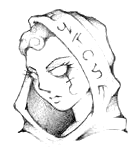The Chaos Cults
Chaos Cultists are far less numerous in Bretonnia than they are in the Empire. Adventurers expecting to find chaos cultists at the bottom of every plot and intrigue will often find themselves searching in vain. Bretonnian culture has been profoundly affected by the taint of chaos, but this does not express itself primarily in direct worship of the chaos gods. Many Bretonnian nobles are in fact profoundly perverse, displaying extremes of cruelty, immorality, greed, pride, and a general willingness to indulge in the darker desires of the human heart, that makes them notorious throughout the Old World. As we have seen, the Bretonnian cults have in many ways turned away from the ideals they should be upholding and their worship is often an empty meaningless thing that exists only to justify the political power wielded by the cults themselves. It is just as satisfying to the gods of chaos to see a group of people who think they are devout Shallyans exploiting the sick and poor, living lives of obscene luxury, and indulging in the occasional orgy, as it would be if these people actually established themselves as a cult of Slaanesh. Bretonnian society as a whole turns a blind eye to the excesses of the rich and powerful, and such things are never openly discussed at court except by the most jaded and perverted aristocrats, who simply don't care about appearances. However, it is common knowledge that some nobles have rather eccentric tastes. Open worship of the chaos gods occurs nowhere except in Moussillon.

The most popular of the chaos powers in
Bretonnia is indisputably
Slaanesh. Most circles of nobility have some connection to secret
orgiastic societies, whether or not they are full cults of Slaanesh.
The main Slaaneshi cult in the kingdom is the "Purple hour", and many
influential nobles have taken part in orgies organised by the cult.
Slaaneshi cults tend to be organised by the aristocracy, but often
include members of the merchant classes, and often numerous pretty
peasants. For the lower classes joining the cult of Slaanesh can
occasionally appeal to their desire for social advancement as well as
their more earthly desires, as an attractive or well-endowed peasant
can find themselves plucked from obscurity to be given a place of
influence in a noble's service because of certain other services they
render in the activities of the cult. In Couronne the prevailing cult
of pleasure is largely inspired by Slaanesh. Shrines to Slaanesh can be
found hidden away on many estates, and it is rumoured that there is a
temple hidden somewhere in the Oisillon palace and grounds.
Nurgle is, unsurprisingly, very popular amongst the urban poor. A cult which teaches that disease and squalor are power, that these very tools of oppression can be employed as a weapon against the powers that be, has obvious appeal. In times of plague many will offer prayers to both Shallya and Nurgle. The cult of Shallya, although convinced of the need to oppose Nurgle, does not see the cult as a real threat and is in any event too corrupt itself to do much to resist its influence. It is, however, largely due to the activities of the grass-roots members of the cult of Shallya (often branded heretical by their superiors) that the cult of Nurgle has not completely captured the souls of the poor. Worship of Nurgle is still seen by the majority of the population as wrong (rather than simply being illegal), and as something that displeases Shallya (indeed those invoking Nurgle will often carefully conceal any symbol of Shallya before doing so, in the superstitious belief that if they cannot see the goddess then she cannot see them). Temples to Nurgle exist in the sewers of several Bretonnian cities.
Tzeentch has some adepts amongst the nobility, though many powerful nobles are perfectly capable of Machiavellian scheming without any need of inspiration by the Lord of Change. The most significant followers of Tzeentch are probably found in academia, where wizards and sages occasionally find themselves drawn into his worship through their desire for esoteric knowledge forbidden by the authorities.
Khorne has never had much appeal, except to some members of the military. However, in an environment in which clerics of Myrmidia argue that making a bloody example of a village or two is the most expedient way of crushing a peasant revolt, identifying followers of the blood god is not always easy.
The Law Cults
Though not actually proscribed, worship of the gods of Law remains far from commonplace in Bretonnia. It is very much limited to a small number of secretive groups typically dedicated to only one of the powers of Law. Most of these cults started centuries ago, introduced by early settlers coming from the southern Old World. One Bretonnian singularity is that cult of Solkan the god of Vengeance is not pre-eminent. This is probably linked to the fact that Bretonnians don’t feel very concerned about the threat of Chaos. Small sects of worshippers of Alluminas and even Arianka exist.